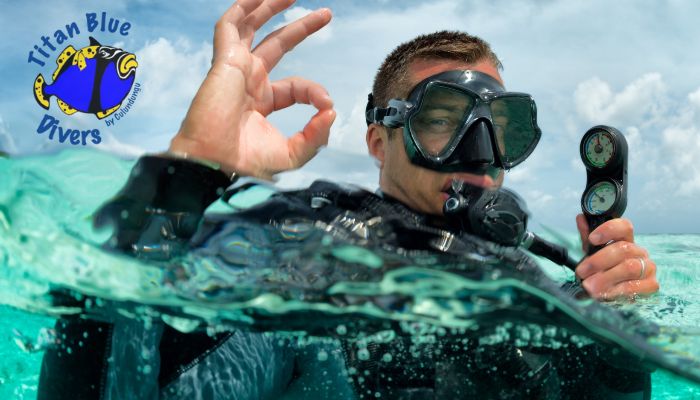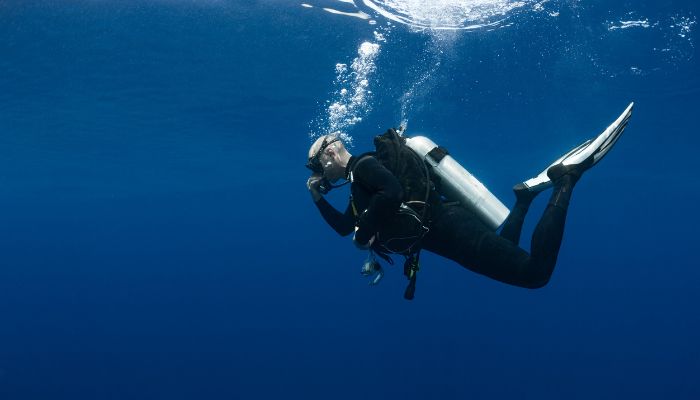10 Mistakes You Should NOT Make Before You Dive

Diving in Lanzarote is an unparalleled experience, a journey into a completely different world, full of mysteries and treasures. But did you know that many amateurs make crucial mistakes before diving? Some carelessness may be minor, but others have very serious consequences.
In this post, we tell you what to avoid before any dive, plus some additional tips to make every dive as safe as it is fun.
Which of these mistakes do you make? Or, if you are thinking of starting your first dives, which one have you heard of? Find out right away!
10 Mistakes to Avoid Before Diving
1. Not Planning your Immersion
Planning is essential, and it's not just about choosing a nice place to dive. It is vital to know the profile of the dive, the characteristics of the site, and to have an emergency plan:
- Dive profile: Determines maximum depth, bottom time and safety levels.
- Points of interest: Is there a coral formation you want to visit? Or do you want to go wreck diving? Put it in your plan.
- Emergency plan: Establish meeting points in case of separation and know the exit routes.
📌Beware also:
- Disregard sea conditions and weather: Tides, currents and sudden weather changes can drastically alter your dive plans. Always check the forecasts and take into account the seasons of the year. For example, there are times when currents are stronger due to natural phenomena.
- Do not check dive sites: Each dive site has its own characteristics. Some are suitable for beginners, while others require more experience due to currents or depths. Knowing the site will help you avoid dangerous surprises.
2. Not Wearing Proper Equipment
Underwater, your diving equipment is your life. It must not only be of good quality, but also suitable for the type of dive you are going to do.
- Basic equipment: Make sure that your regulator, BCD and tank are in good condition and have passed the periodic inspections.
- Accessories according to dive: If you are going to do a night dive, you will need a flashlight. For cold water, a dry suit may be essential.
📌Beware also:
- Carrying damaged equipment: A small crack in your regulator or a worn gasket can be the difference between an incredible dive and an emergency situation. Don't ignore the signs of wear and tear.
- Not checking the amount of ballast: Incorrect ballast can cause you to consume air more quickly or have difficulty maintaining buoyancy. Adjust your weight according to your weight, equipment and type of water (salt or fresh).
3. Doing Solo Dives or Separating from your Partner
Diving is always safer (and more fun) in company. Your buddy can help you in tricky situations, such as a cramp or a problem with your equipment.
- Maintain eye contact: Don't lose sight of your partner and establish dive signals beforehand.
- Check each other's equipment: Before you dive in, check your partner's equipment and let him do the same for you. Sometimes a second opinion detects problems you may have overlooked.

4. Ignoring physical and health conditions
Diving is not only a physical activity, it is an interaction of your body with a completely different environment. Therefore, your health and fitness play a fundamental role.
Follow these recommendations and make sure you are fit for your adventure:
- Medical check-ups: If you suffer from any chronic disease such as diabetes, hypertension or lung problems, always consult a medical specialist before diving.
- Avoid diving with a cold or nasal congestion: This can hinder compensation and cause pain or injury to ears and sinuses.
- Avoid fatigue from heavy eating: what to eat before diving is one of the most common queries. In this regard, you should avoid heavy meals. These can affect your oxygen consumption and your reflexes, which are vital on every dive.
5. Make Rapid Promotions
Ascent speed is crucial to avoid decompression sickness.
These occur when you go up too fast and nitrogen bubbles form in your blood.
To avoid this:
- Maintain a constant speed: Do not exceed 10-15 meters per minute, and even slower when you are less than 6 meters from the surface.
- Make safety stops: Even if you have not reached great depths, a 3-minute stop at 5 meters can be very beneficial.
6. Breath-holding
One of the first tips you learn when diving is to never hold your breath. Holding your breath can cause the air in your lungs to expand, leading to serious injury.
- Breathe slowly and continuously: This helps you conserve air and maintain buoyancy.
- Avoid hyperventilating: Breathing rapidly before diving can lead to hypoxia, a dangerous condition.
The key is balance.
7. Exposure to Altitude After Diving
Climbing mountains or flying in an airplane after diving without adequate waiting time may cause decompressive symptoms.
Wait at least 12 hours if you have made a single dive and 24 hours if you have made multiple dives before flying or exposing yourself to altitudes above 300 meters.
8. Not Compensating Your Ears and Mask While Diving (The Right Way)
Compensation is essential to balance the internal pressure with that of the aquatic environment.
Perform compensation maneuvers as soon as you start to descend:
- You can swallow saliva or blow gently through your nose with your mouth closed.
- Clear your mask regularly to avoid air accumulation and improve your visibility.
9. Not Respecting the Time Between Dives
Surface time allows your body to eliminate residual nitrogen.
Use a dive table or dive computer: These will tell you how long to wait before your next dive.
10. Do Not Take Out Diving Insurance
Diving is an amazing experience, but it also presents risks. A good diving insurance will cover possible medical treatments, evacuations or even hyperbaric.
Moreover, the most important thing is that you will feel at ease at all times and you will live your moment without worries.
Asegúrate de elegir lo mejor entre los seguros de buceo ¿Qué debes tener en cuenta? Lo esencial es verificar que cubre lo que realmente necesitas, como tratamientos en cámaras hiperbáricas o evacuaciones de emergencia.
Remember that diving is an activity that demands respect and preparation. These recommendations will help you to make every dive a safe and enriching experience.
At Titan Blue Divers we take you to discover the incredible underwater world safely and responsibly. Discover here our guided dive plans.

